【BBC六分钟英语】我们为什么要拖延?

【英文脚本】
Alice
Hello and welcome to 6 Minute English. I’m Alice…
Rob
…and I’m Rob.
Alice
So Rob, did you get that research done that I asked you to do over the weekend?
Rob
Oh … It was at the top of my to-do list. But Sunday night came around so quickly, and I just, you know, I didn’t get round to it.
Alice
Rob! If I’d known you weren’t going to do the research, I’d have done it myself. What did you actually do at the weekend, anyway?
Rob
Oh, you know, this and that. It’s funny how time slips by without you noticing.
Alice
Hmm, yes. I bet you spent the whole weekend watching cat videos on YouTube, and googling your own name.
Rob
What? That’s unfair and untrue, Alice, well, mostly untrue, anyway, I did some shopping and I fixed my bike as well as watching videos and googling myself.
Alice
Well, perhaps I should say at this point that today’s show is about procrastination, which means not doing something you’re supposed to do.
Rob
Well, I do feel bad about my procrastination actually.
Alice
Well, that’s good to hear. But let’s move on now and hear today’s quiz question: Can you tell me which American said: ‘You may delay, but time will not?’ Was it… a) John F Kennedy? b) Benjamin Franklin? Or c) Franklin Roosevelt?
Rob
OK. I think I’ll go for a) John F Kennedy because I reckon he was good at making to-do lists and then getting on with them.
Alice
Unlike somebody I could mention.
Rob
Alice, I thought we were going to move on?
Alice
Alright then.
Rob
Personally, I think it’s important to try and understand why we procrastinate. So let’s hear from Daphna Oyserman, Professor of Psychology, Communication and Education at the University of Southern California, talking about this.
Daphna Oyserman, Professor of Psychology, Communication and Education at the University of Southern California
People spend most of their time focussed on the present, which makes perfect sense because the present is now, and for sure. Unfortunately, many things that are quite important about the future require that we start doing things now rather than waiting for later to happen. Things like saving for retirement, studying for college entry exams, revising papers, preparing for work reports. Unfortunately, waiting till later means that we won’t have much time.
Alice
So, we are too focussed on the present, and reluctant to engage in tasks that relate to the future. Why’s that, Rob?
Rob
Well, like Professor Oyserman says, things in the future may never happen, or seem too far off for you to take seriously. For example, when you’re young, sorting out a pension plan doesn’t feel like a priority, or something that’s more important than other things.
Alice
But according to a new study, if you think about time in smaller units, so days, for example, rather than months or years, you are likely to start a task more quickly.
Rob
So, this weekend I wasted two days…
Alice
Or 2,880 minutes.
Rob
That does sound more urgent, when you put it like that.
Alice
Yes. And you need to minimize, or reduce, distractions. Turn off your tech and knuckle down to your tasks, Rob.
Rob
To knuckle down, by the way, means to start working hard. But Alice, sometimes it’s hard to knuckle down to a task when you don’t know how to start it, or you’re scared to start it, or sometimes just because you know it’s going to be really tedious, and that means boring.
Alice
Yes. So what’s your excuse, Rob?
Rob
Well, it’s boredom, usually.
Alice
You should try temptation bundling.
Rob
Temptation bundling - what’s that?
Alice
Temptation bundling means doing two activities together, one you should do but are avoiding, and one you love doing which isn’t productive.
Rob
For example, eating biscuits while I work?
Alice
Yes, that’s right. That sounds like a good one for you, Rob.
Rob
It might be a good idea actually. Well, let’s listen to Dr Catherine Loveday talking about how we often underestimate how long things will take us.
Dr Catherine Loveday, Westminster University
There’s this thing called the planning fallacy. My favourite one is always the example of the Oxford English Dictionary that they started in 1857 and it was supposed to take five years, but five years later they’d only got to the word ‘ant’. In the end it took another 70 years and then it was out of date and they had to start again anyway. We never seem to get any better at judging time in the future and how long things will take us.
Rob
That’s Dr Catherine Loveday. So what’s a fallacy, Alice?
Alice
It’s a mistaken belief or idea.
Rob
And for the famous Oxford English Dictionary, their mistake was to think they would get the work done in five years when it actually took 70!
Alice
Gosh! Wow! What a long time! And talking about time, ours is running out, let’s go back to today’s question. I asked: Which American said, “You may delay, but time will not?” Was it … a) John F Kennedy, b) Benjamin Franklin or c) Franklin Roosevelt?
Rob
And I very confidently said John F Kennedy.
Alice
Yes, you did. And you were wrong today Rob, I’m afraid. It was Benjamin Franklin, one of the Founding Fathers of the United States. Franklin was a leading author, printer, political theorist, politician, freemason, postmaster, scientist, inventor, civic activist, statesman, and diplomat. I doubt he wasted much waste time procrastinating!
Rob
No. OK, without further delay, here are the words we learned today: procrastination priority minimize knuckle down tedious temptation bundling fallacy
Alice
Well, that’s the end of today’s 6 Minute English. Please join us again soon!
Both
Bye.
【中英文双语脚本】
Alice(爱丽丝)
Hello and welcome to 6 Minute English. I’m Alice…
您好,欢迎来到 6 Minute English。我是 Alice…
Rob(罗伯)
…and I’m Rob.
…我是 罗伯。
Alice(爱丽丝)
So Rob, did you get that research done that I asked you to do over the weekend?
那么 罗伯,你完成了我让你在周末做的研究吗?
Rob(罗伯)
Oh … It was at the top of my to-do list. But Sunday night came around so quickly, and I just, you know, I didn’t get round to it.
哦。。。它在我的待办事项清单上名列前茅。但星期天晚上来得太快了,我只是,你知道的,我没来得及去做。
Alice(爱丽丝)
Rob! If I’d known you weren’t going to do the research, I’d have done it myself. What did you actually do at the weekend, anyway?
抢!如果我知道你不打算做研究,我会自己做。你周末到底做了什么呢?
Rob(罗伯)
Oh, you know, this and that. It’s funny how time slips by without you noticing.
哦,你知道的,这个和那个。有趣的是,时间是如何在不知不觉中流逝的。
Alice(爱丽丝)
Hmm, yes. I bet you spent the whole weekend watching cat videos on YouTube, and googling your own name.
嗯,是的。我敢打赌,你整个周末都在 YouTube 上看猫咪视频,并在 Google 上搜索你自己的名字。
Rob(罗伯)
What? That’s unfair and untrue, Alice, well, mostly untrue, anyway, I did some shopping and I fixed my bike as well as watching videos and googling myself.
什么?这是不公平和不真实的,爱丽丝,嗯,大部分都是不真实的,无论如何,我买了一些东西,修好了我的自行车,还看了视频和谷歌搜索自己。
Alice(爱丽丝)
Well, perhaps I should say at this point that today’s show is about procrastination, which means not doing something you’re supposed to do.
好吧,也许我应该在这一点上说,今天的节目是关于拖延的,这意味着不做你应该做的事情。
Rob(罗伯)
Well, I do feel bad about my procrastination actually.
嗯,我确实对我的拖延感到难过。
Alice(爱丽丝)
Well, that’s good to hear. But let’s move on now and hear today’s quiz question: Can you tell me which American said: ‘You may delay, but time will not?’ Was it… a) John F Kennedy? b) Benjamin Franklin? Or c) Franklin Roosevelt?
嗯,很高兴听到。但是,现在让我们继续前进,听听今天的测验问题:您能告诉我哪个美国人说:’你可以拖延,但时间不会?是不是……a) 约翰·肯尼迪?b) 本杰明·富兰克林?或者 c) 富兰克林·罗斯福?
Rob(罗伯)
OK. I think I’ll go for a) John F Kennedy because I reckon he was good at making to-do lists and then getting on with them.
还行。我想我会选择 a) John F Kennedy,因为我认为他擅长列出待办事项清单,然后继续执行它们。
Alice(爱丽丝)
Unlike somebody I could mention.
不像我能提到的人。
Rob(罗伯)
Alice, I thought we were going to move on?
Alice,我以为我们会继续前进?
Alice(爱丽丝)
Alright then.
好吧。
Rob(罗伯)
Personally, I think it’s important to try and understand why we procrastinate. So let’s hear from Daphna Oyserman, Professor of Psychology, Communication and Education at the University of Southern California, talking about this.
就我个人而言,我认为尝试理解我们为什么拖延很重要。那么,让我们听听南加州大学心理学、传播学和教育学教授 Daphna Oyserman 谈论这个问题。
Daphna Oyserman, Professor of Psychology, Communication and Education at the University of Southern California(DaphnaOyserman,南加州大学心理学、传播和教育学教授)
People spend most of their time focussed on the present, which makes perfect sense because the present is now, and for sure. Unfortunately, many things that are quite important about the future require that we start doing things now rather than waiting for later to happen. Things like saving for retirement, studying for college entry exams, revising papers, preparing for work reports. Unfortunately, waiting till later means that we won’t have much time.
人们将大部分时间都花在了当下上,这非常有意义,因为现在就是现在,而且是肯定的。不幸的是,许多关于未来非常重要的事情要求我们现在就开始做事,而不是等待以后发生。比如为退休储蓄、为大学入学考试而学习、修改论文、准备工作报告。不幸的是,等到以后意味着我们没有太多时间。
Alice(爱丽丝)
So, we are too focussed on the present, and reluctant to engage in tasks that relate to the future. Why’s that, Rob?
因此,我们过于关注现在,不愿意参与与未来相关的任务。为什么呢,罗伯?
Rob(罗伯)
Well, like Professor Oyserman says, things in the future may never happen, or seem too far off for you to take seriously. For example, when you’re young, sorting out a pension plan doesn’t feel like a priority, or something that’s more important than other things.
嗯,就像 Oyserman 教授说的,未来的事情可能永远不会发生,或者看起来太遥远了,以至于你无法认真对待。例如,当您年轻时,整理养老金计划感觉不像是优先事项,或者比其他事情更重要的事情。
Alice(爱丽丝)
But according to a new study, if you think about time in smaller units, so days, for example, rather than months or years, you are likely to start a task more quickly.
但根据一项新的研究,如果您以较小的单位考虑时间,例如几天,而不是几个月或几年,您可能会更快地开始一项任务。
Rob(罗伯)
So, this weekend I wasted two days…
所以,这个周末我浪费了两天……
Alice(爱丽丝)
Or 2,880 minutes.
或 2,880 分钟。
Rob(罗伯)
That does sound more urgent, when you put it like that.
当你这样说时,这听起来确实更紧迫。
Alice(爱丽丝)
Yes. And you need to minimize, or reduce, distractions. Turn off your tech and knuckle down to your tasks, Rob.
是的。你需要尽量减少或减少干扰。关掉你的技术,专心做你的任务,罗伯。
Rob(罗伯)
To knuckle down, by the way, means to start working hard. But Alice, sometimes it’s hard to knuckle down to a task when you don’t know how to start it, or you’re scared to start it, or sometimes just because you know it’s going to be really tedious, and that means boring.
顺便说一句,To knuckle down 的意思是开始努力工作。但是 Alice,有时当你不知道如何开始一项任务,或者你害怕开始它,或者有时只是因为你知道它会非常乏味,这意味着无聊时,你很难专心完成一项任务。
Alice(爱丽丝)
Yes. So what’s your excuse, Rob?
是的。所以你的借口是什么,罗伯?
Rob(罗伯)
Well, it’s boredom, usually.
嗯,通常是无聊。
Alice(爱丽丝)
You should try temptation bundling.
你应该试试诱惑捆绑。
Rob(罗伯)
Temptation bundling - what’s that?
诱惑捆绑 - 那是什么?
Alice(爱丽丝)
Temptation bundling means doing two activities together, one you should do but are avoiding, and one you love doing which isn’t productive.
诱惑捆绑意味着一起做两项活动,一项是你应该做但正在避免的活动,另一项是你喜欢做但效率低下的活动。
Rob(罗伯)
For example, eating biscuits while I work?
例如,我工作时吃饼干?
Alice(爱丽丝)
Yes, that’s right. That sounds like a good one for you, Rob.
是的,没错。这对你来说听起来不错,罗伯。
Rob(罗伯)
It might be a good idea actually. Well, let’s listen to Dr Catherine Loveday talking about how we often underestimate how long things will take us.
实际上,这可能是个好主意。好吧,让我们听听 Catherine Loveday 博士谈论我们经常低估事情需要多长时间。
Dr Catherine Loveday, Westminster University(CatherineLoveday博士,威斯敏斯特大学)
There’s this thing called the planning fallacy. My favourite one is always the example of the Oxford English Dictionary that they started in 1857 and it was supposed to take five years, but five years later they’d only got to the word ‘ant’. In the end it took another 70 years and then it was out of date and they had to start again anyway. We never seem to get any better at judging time in the future and how long things will take us.
有一种叫做规划谬误的东西。我最喜欢的一个总是牛津英语词典的例子,他们于 1857 年开始,本来应该花五年时间,但五年后他们只得到了“蚂蚁”这个词。最后,又花了 70 年时间,然后它就过时了,他们无论如何都不得不重新开始。我们似乎从来没有更好地判断未来的时间以及事情需要多长时间。
Rob(罗伯)
That’s Dr Catherine Loveday. So what’s a fallacy, Alice?
我是 Catherine Loveday 博士。那么什么是谬误,爱丽丝?
Alice(爱丽丝)
It’s a mistaken belief or idea.
这是一个错误的信念或想法。
Rob(罗伯)
And for the famous Oxford English Dictionary, their mistake was to think they would get the work done in five years when it actually took 70!
对于著名的牛津英语词典,他们的错误是认为他们会在五年内完成工作,而实际上需要 70 年!
Alice(爱丽丝)
Gosh! Wow! What a long time! And talking about time, ours is running out, let’s go back to today’s question. I asked: Which American said, “You may delay, but time will not?” Was it … a) John F Kennedy, b) Benjamin Franklin or c) Franklin Roosevelt?
唉!哇!多么漫长的时间啊!说到时间,我们的时间不多了,让我们回到今天的问题。我问:哪个美国人说,’你可以拖延,但时间不会?是不是……a) 约翰·肯尼迪,b) 本杰明·富兰克林或 c) 富兰克林·罗斯福?
Rob(罗伯)
And I very confidently said John F Kennedy.
我非常自信地说约翰·肯尼迪。
Alice(爱丽丝)
Yes, you did. And you were wrong today Rob, I’m afraid. It was Benjamin Franklin, one of the Founding Fathers of the United States. Franklin was a leading author, printer, political theorist, politician, freemason, postmaster, scientist, inventor, civic activist, statesman, and diplomat. I doubt he wasted much waste time procrastinating!
是的,你做到了。恐怕你今天错了,罗伯。他就是美国开国元勋之一本杰明·富兰克林(Benjamin Franklin)。富兰克林是一位领先的作家、印刷商、政治理论家、政治家、共济会会员、邮政局长、科学家、发明家、公民活动家、政治家和外交家。我怀疑他浪费了太多时间拖延!
Rob(罗伯)
No. OK, without further delay, here are the words we learned today: procrastination priority minimize knuckle down tedious temptation bundling fallacy
不。好的,事不宜迟,以下是我们今天学到的词语: 拖延优先 最大限度地减少 kunuckle down 乏味的诱惑捆绑谬误
Alice(爱丽丝)
Well, that’s the end of today’s 6 Minute English. Please join us again soon!
好了,今天的六分钟 English 到此结束。请尽快再次加入我们!
Both(双)
Bye.
再见。

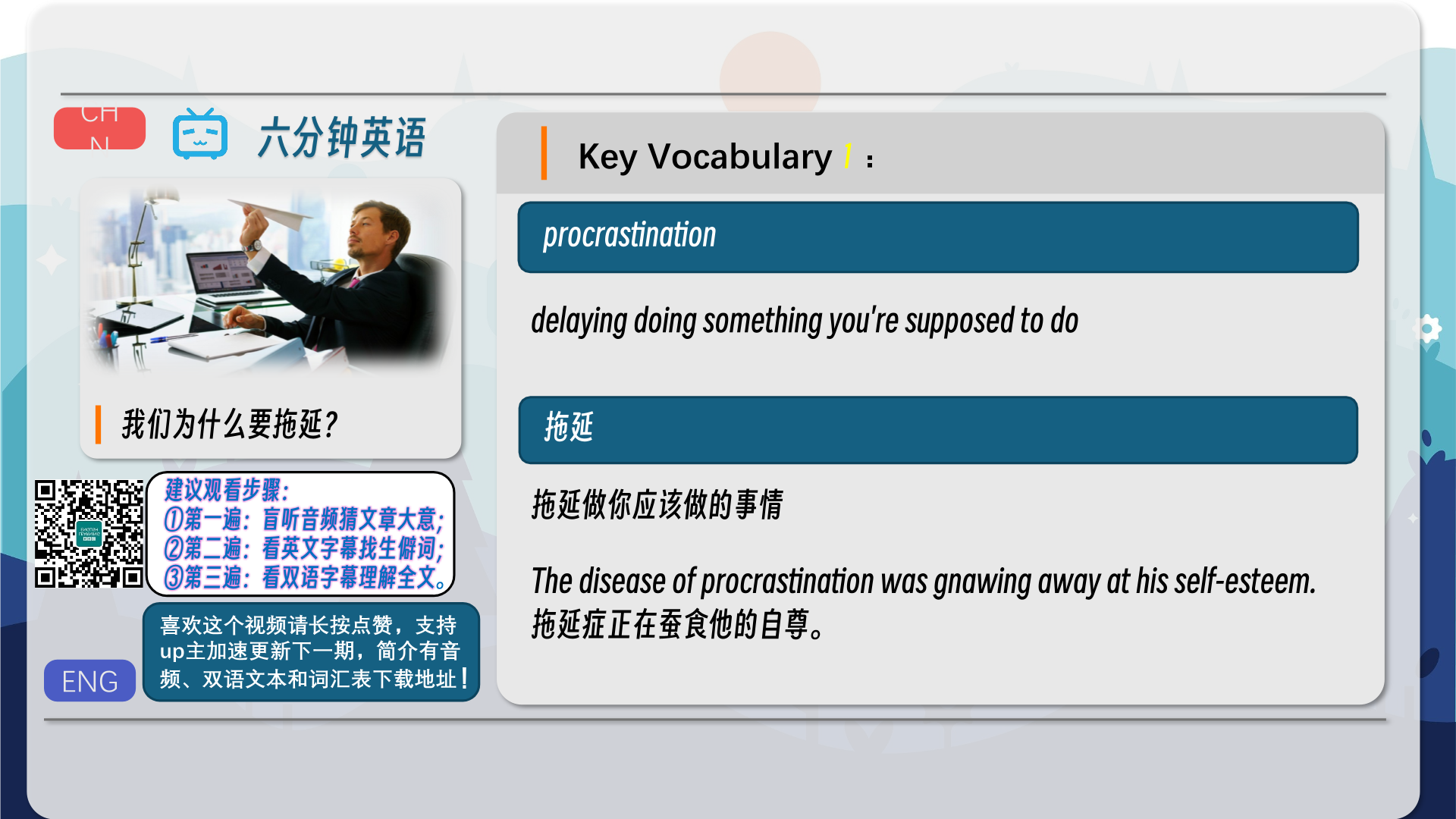
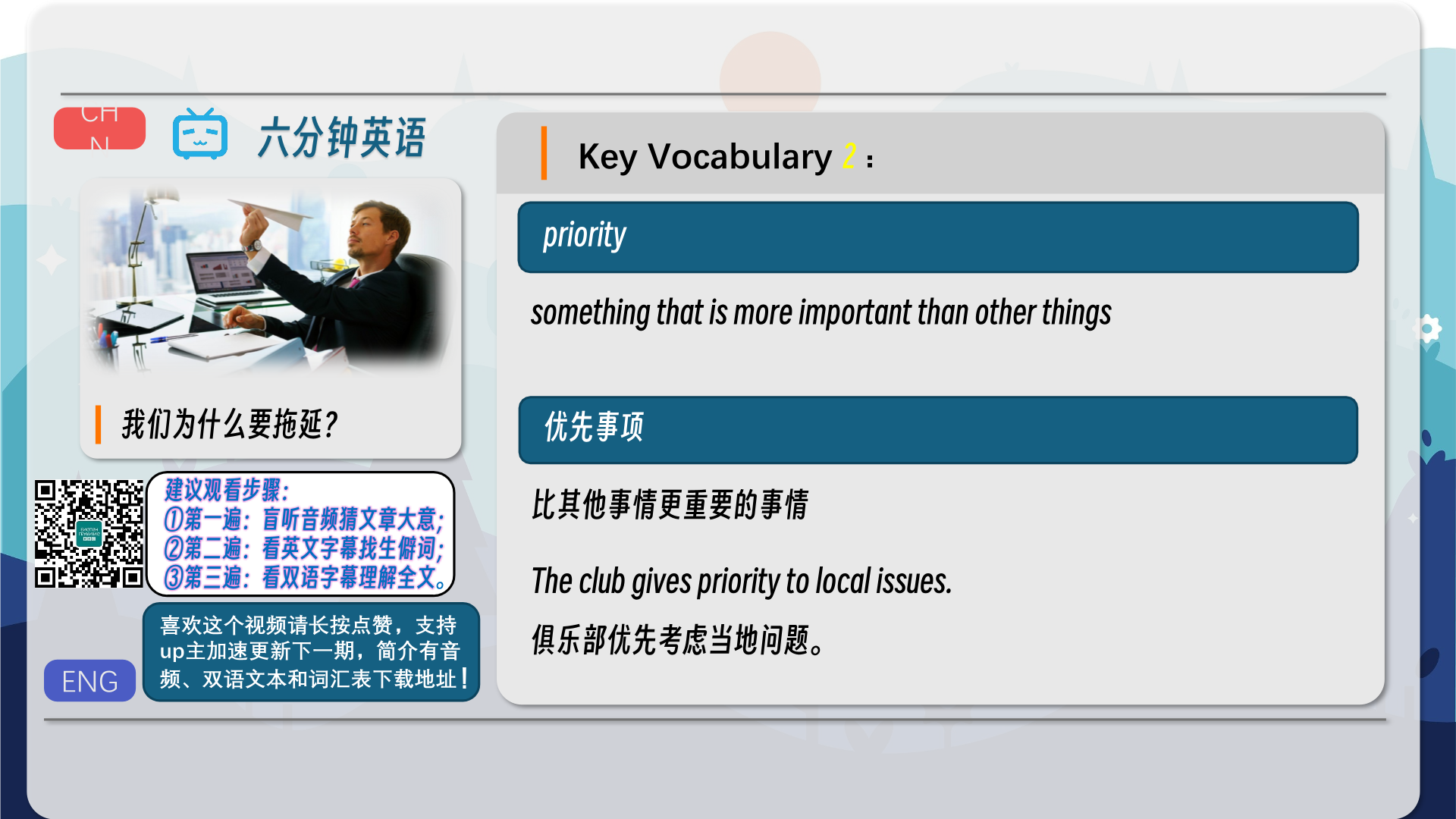
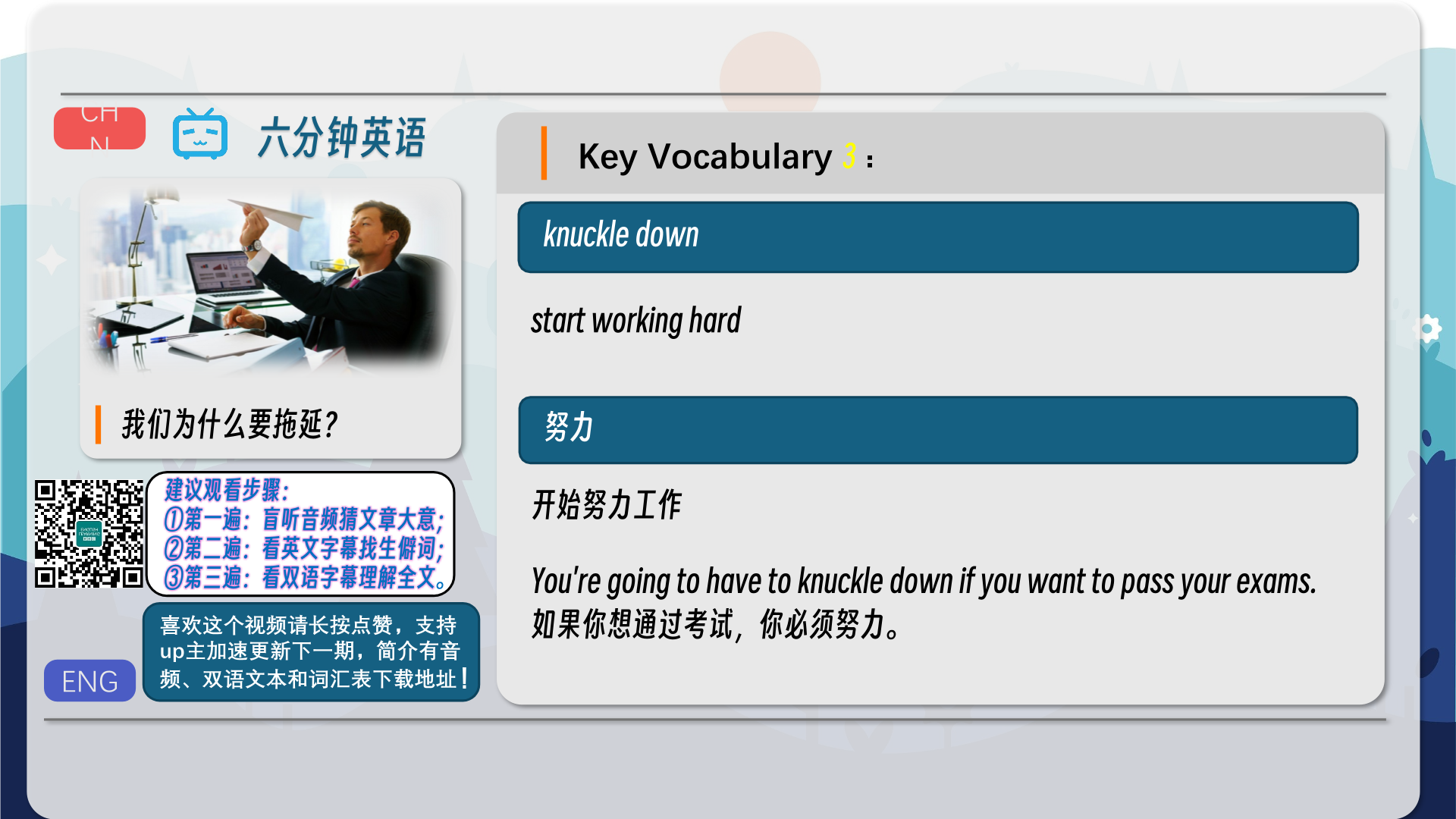
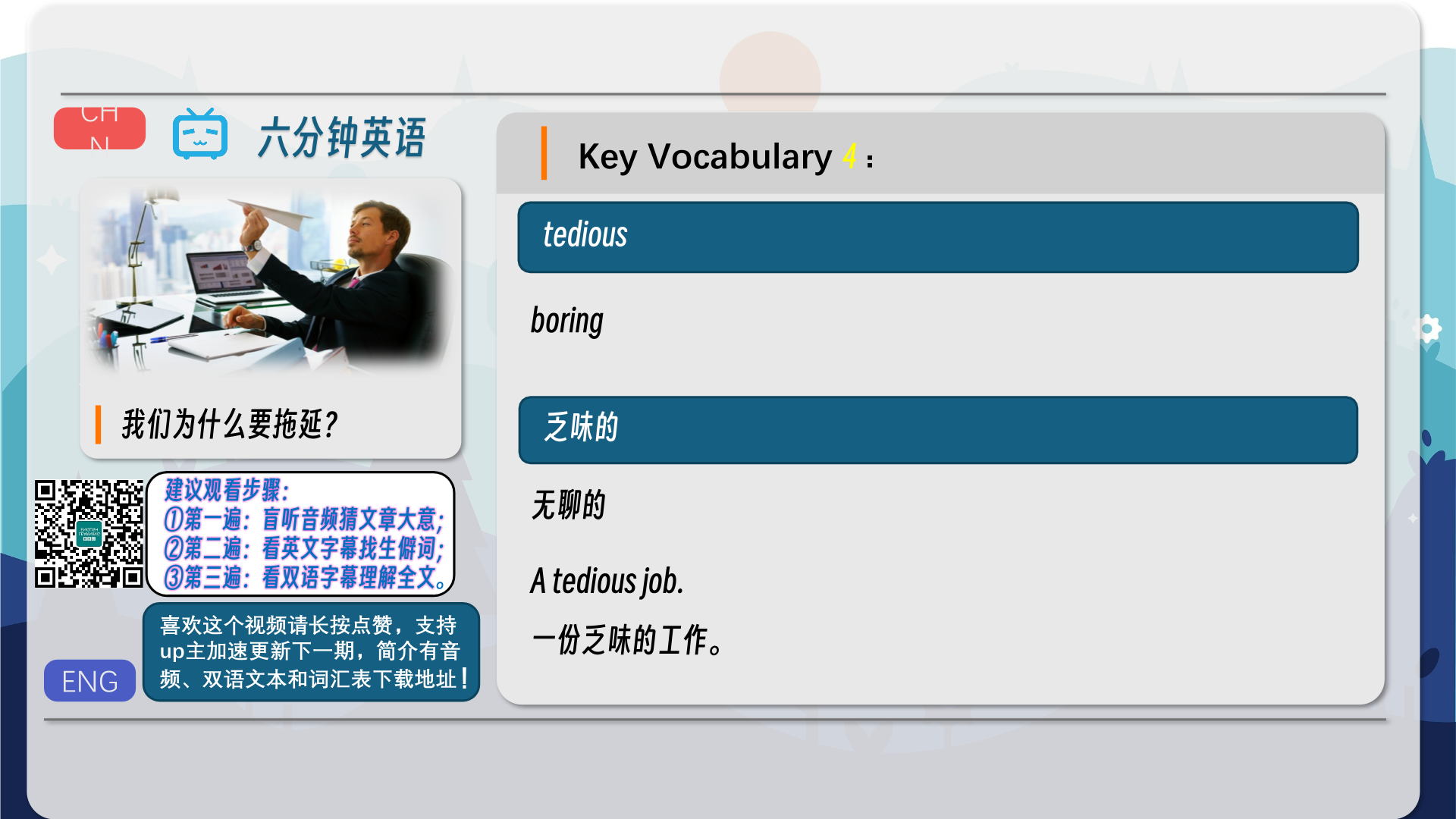
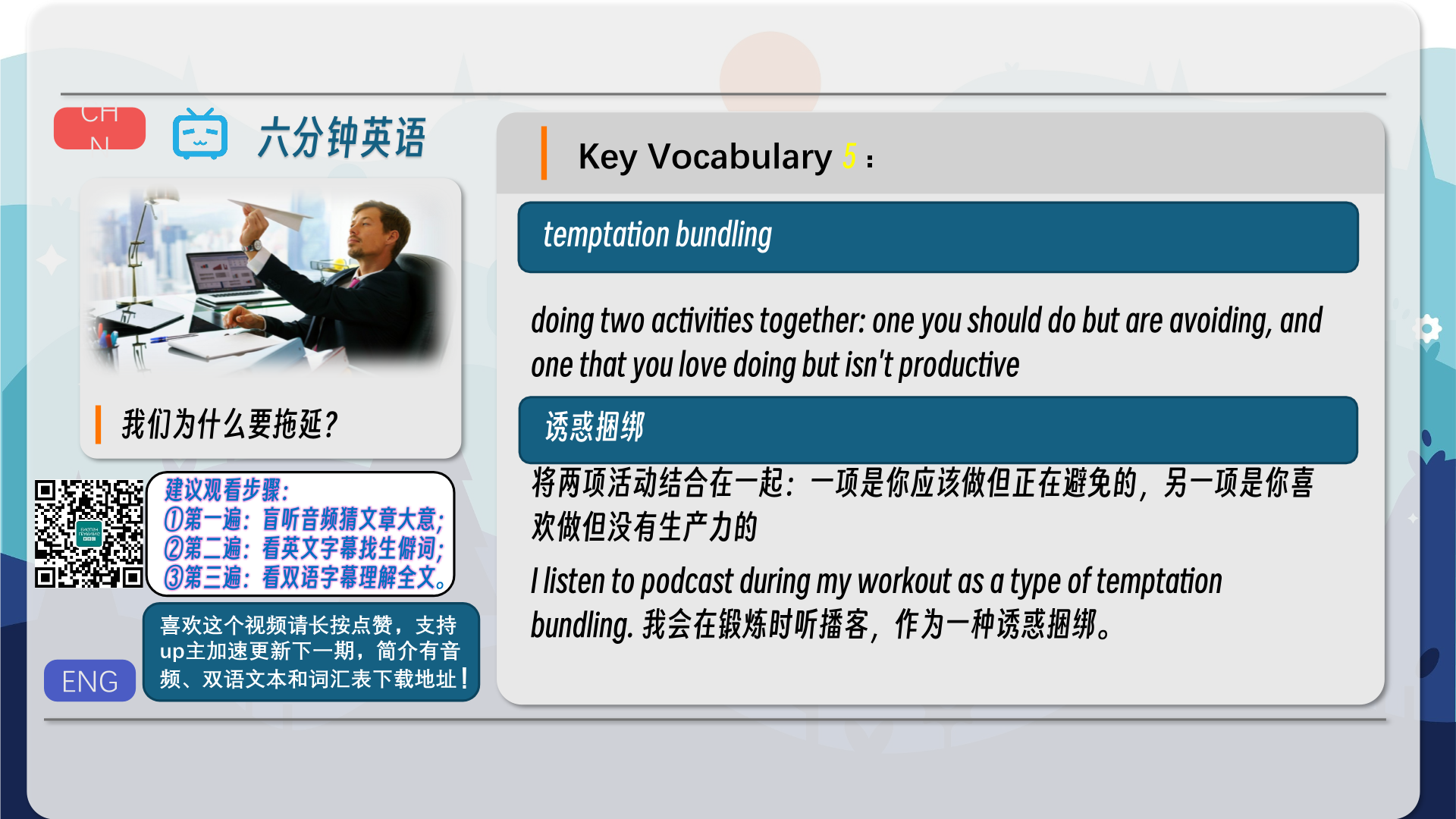
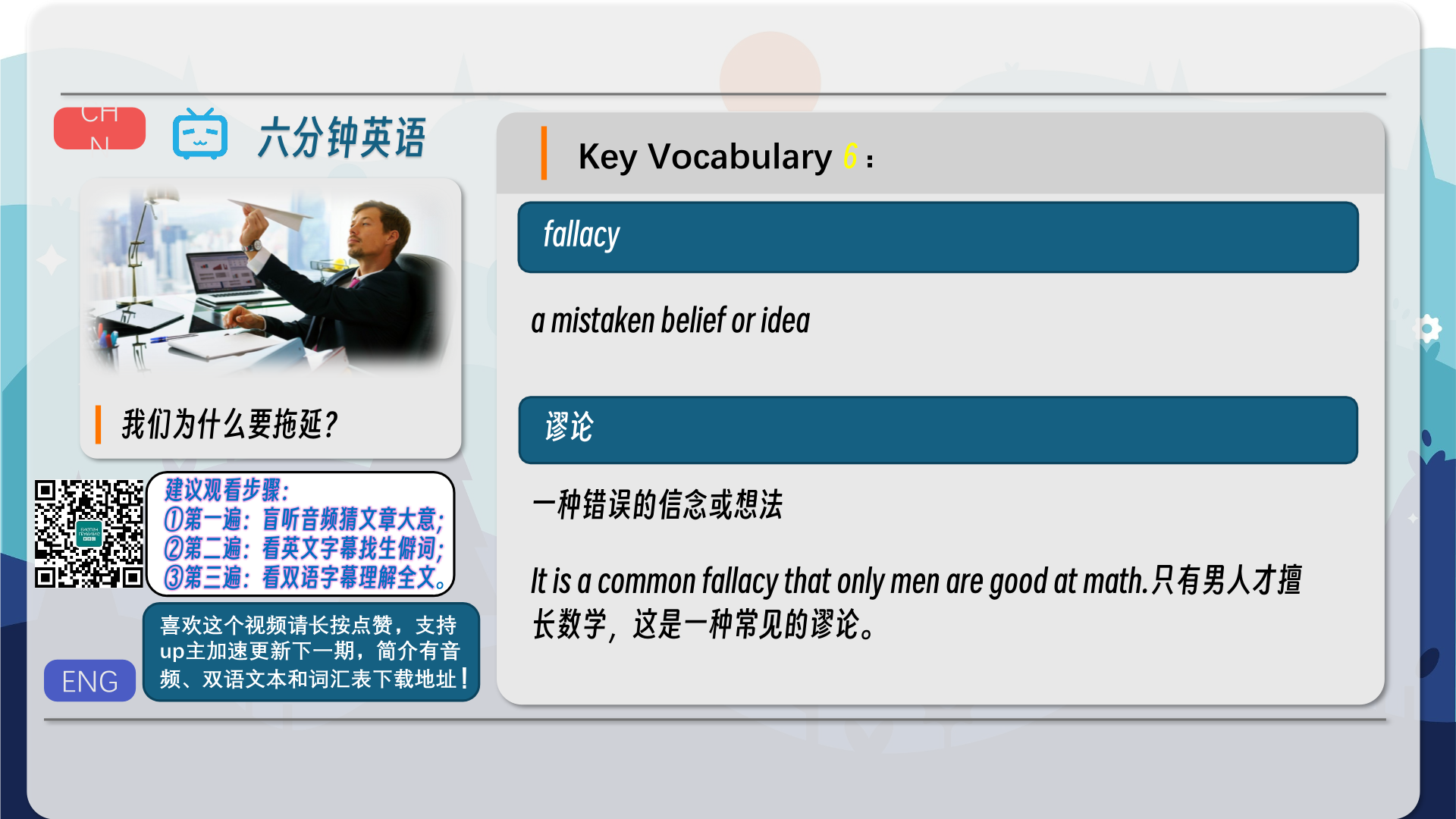
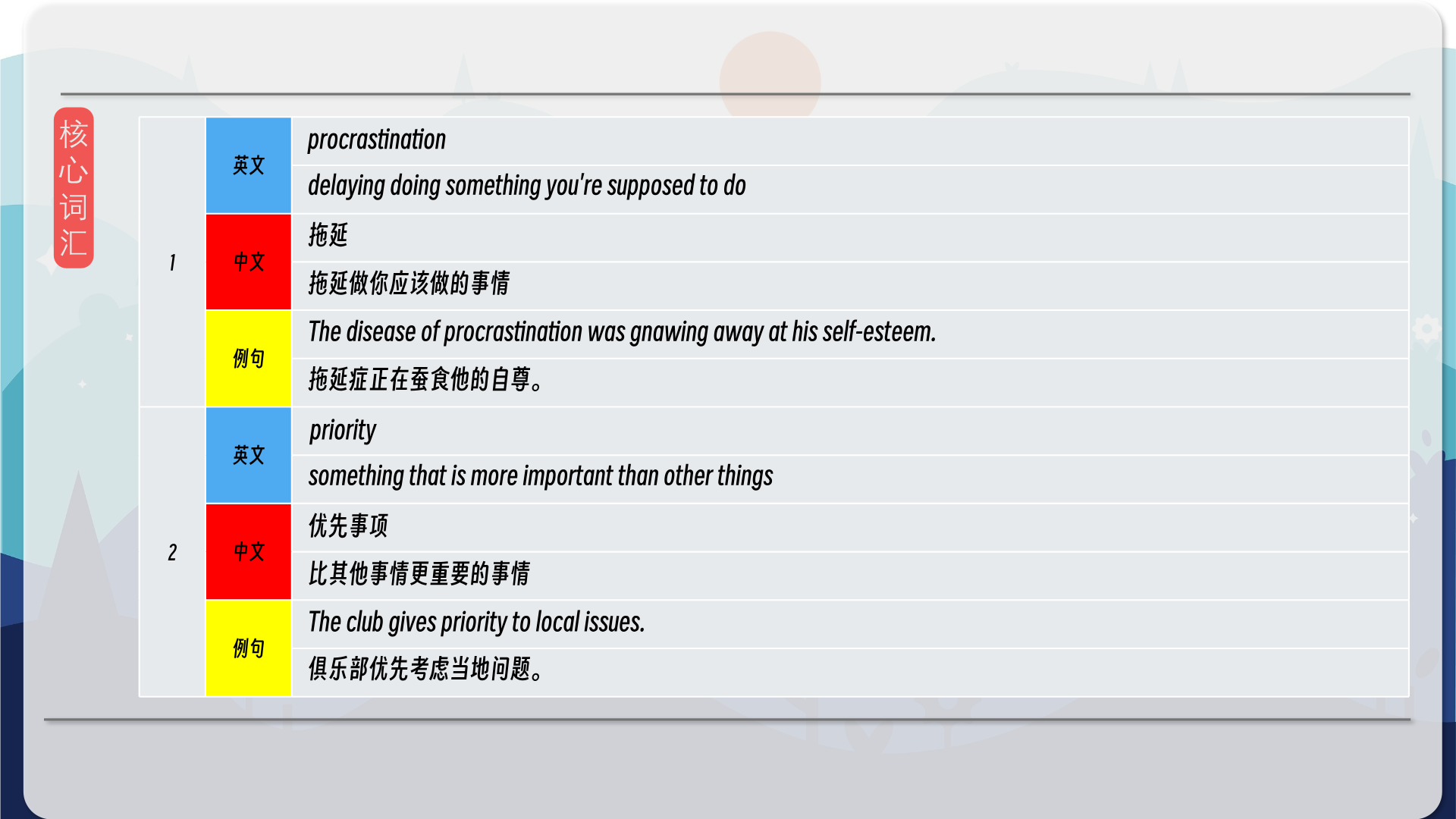
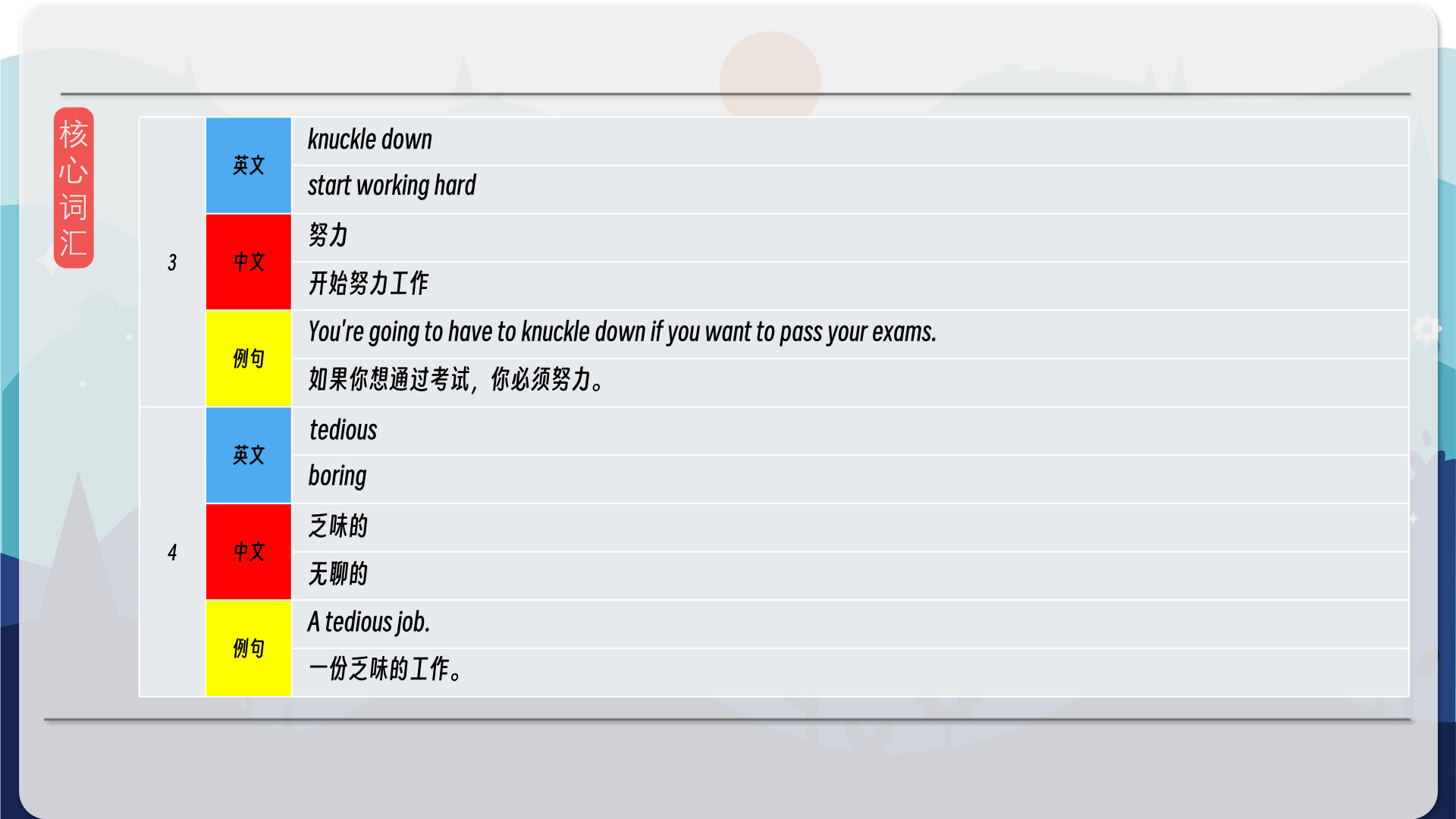
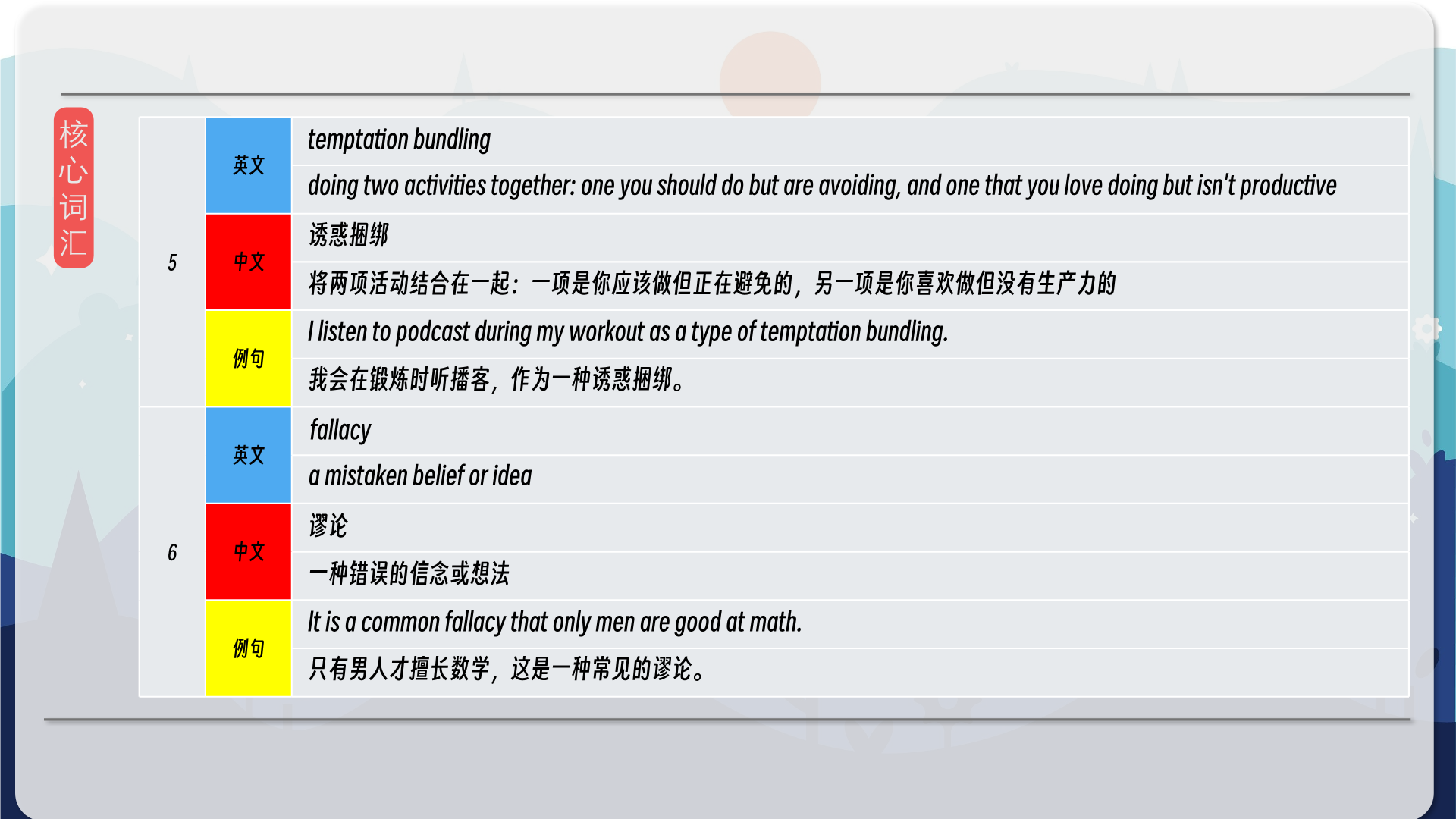
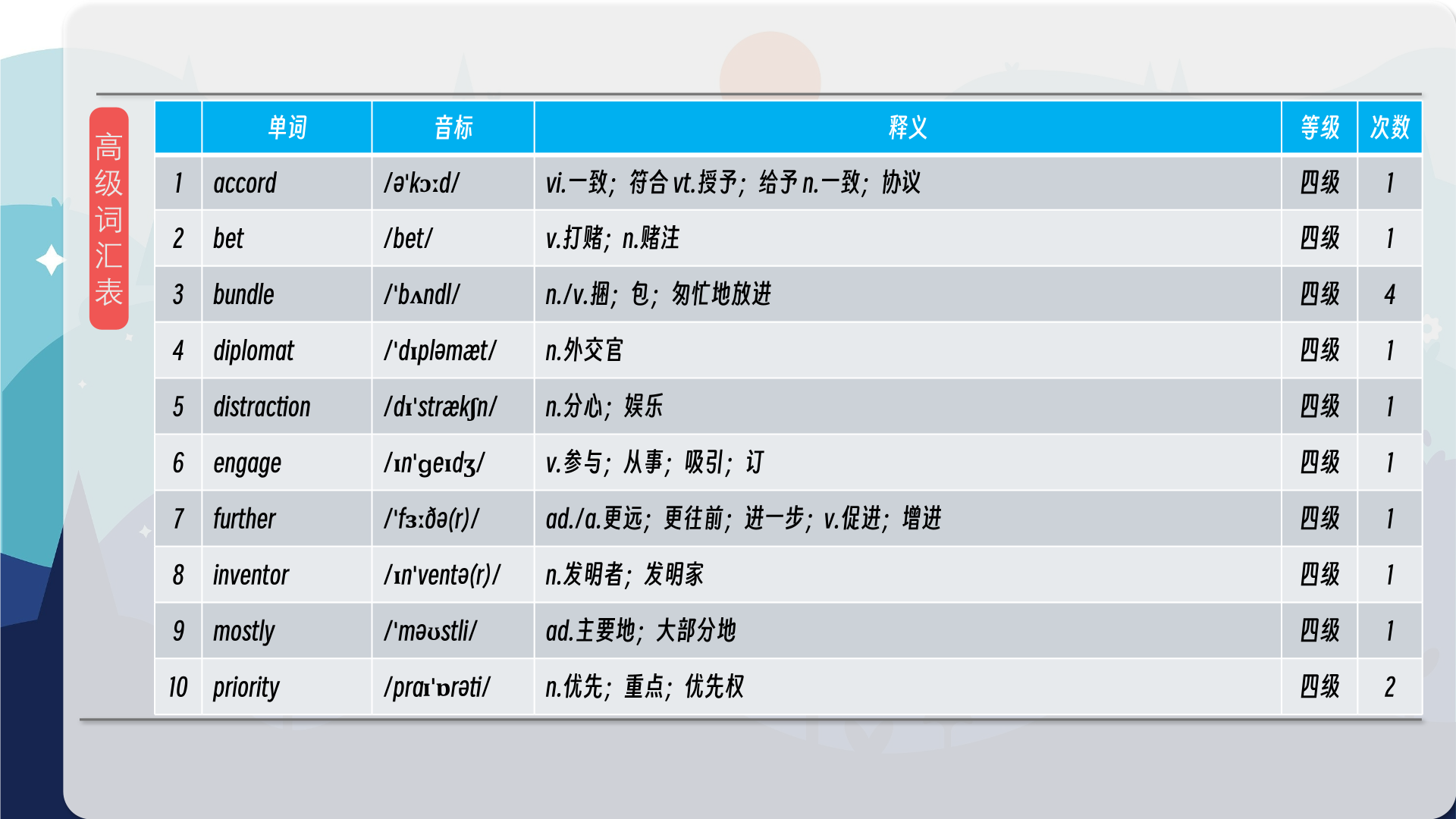
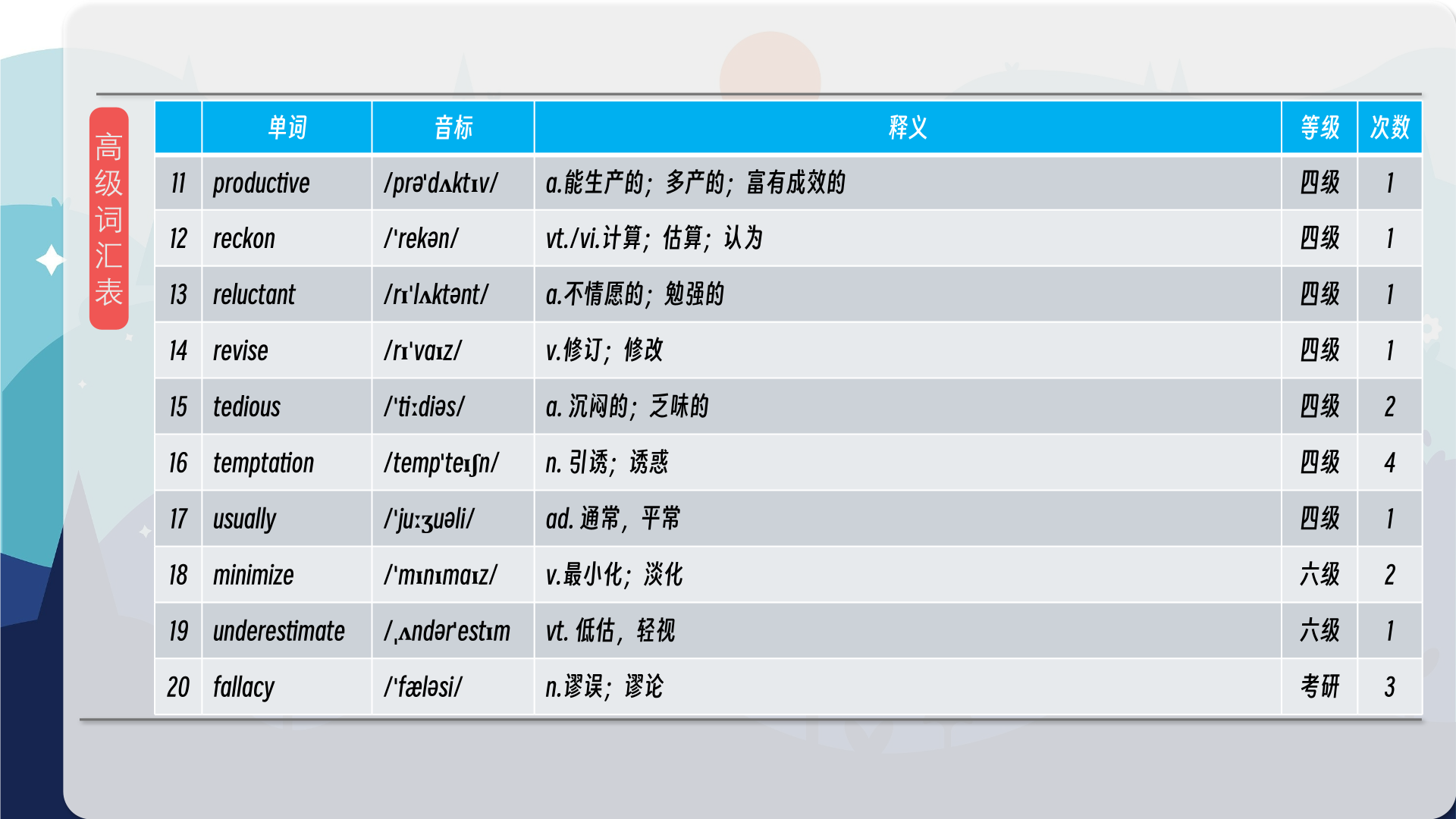
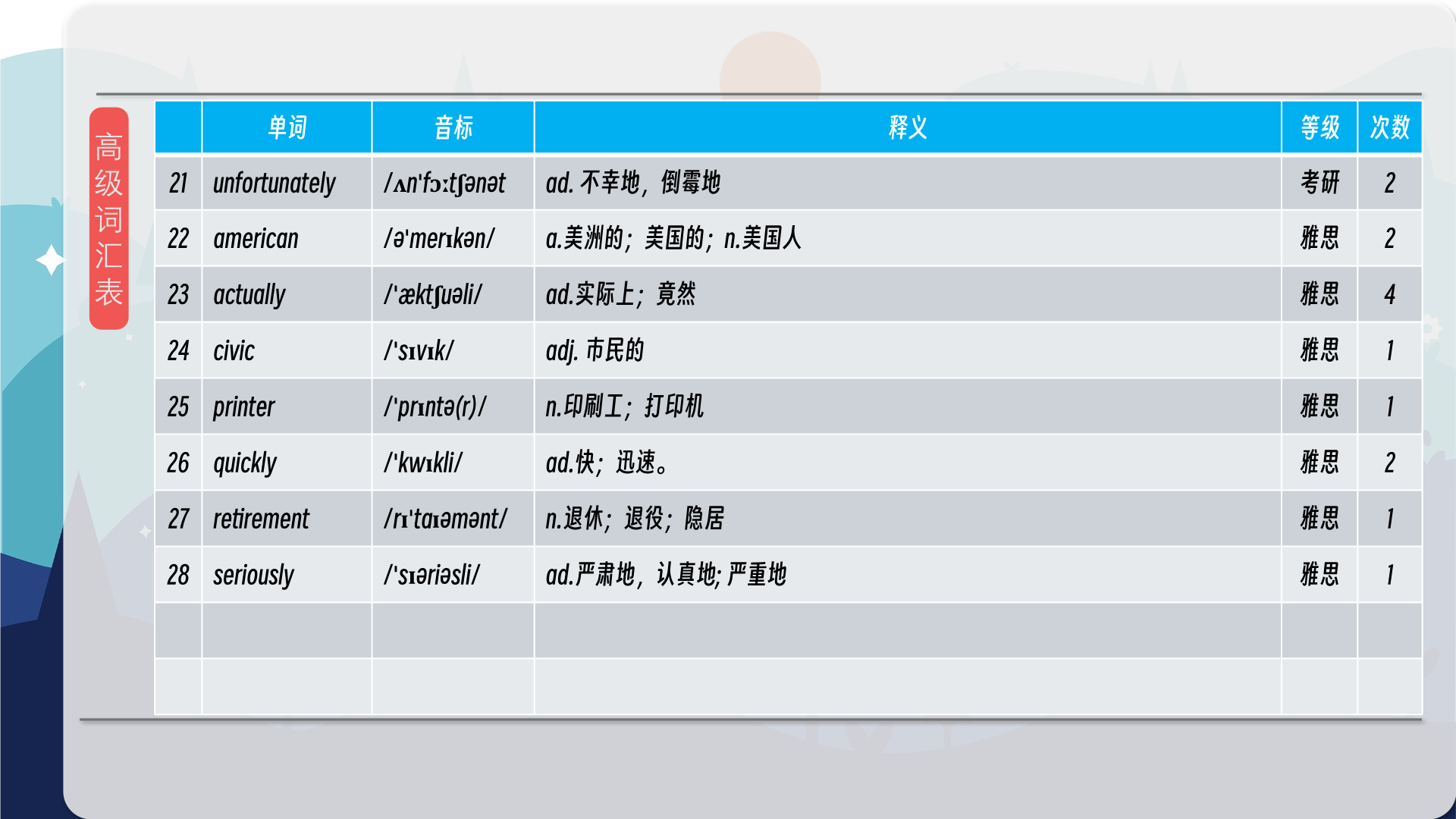

【核心词汇】
procrastination
delaying doing something you’re supposed to do
拖延
拖延做你应该做的事情
The disease of procrastination was gnawing away at his self-esteem.
拖延症正在蚕食他的自尊。
priority
something that is more important than other things
优先事项
比其他事情更重要的事情
The club gives priority to local issues.
俱乐部优先考虑当地问题。
knuckle down
start working hard
努力
开始努力工作
You’re going to have to knuckle down if you want to pass your exams.
如果你想通过考试,你必须努力。
tedious
boring
乏味的
无聊的
A tedious job.
一份乏味的工作。
temptation bundling
doing two activities together: one you should do but are avoiding, and one that you love doing but isn’t productive
诱惑捆绑
将两项活动结合在一起:一项是你应该做但正在避免的,另一项是你喜欢做但没有生产力的
I listen to podcast during my workout as a type of temptation bundling.
我会在锻炼时听播客,作为一种诱惑捆绑。
fallacy
a mistaken belief or idea
谬论
一种错误的信念或想法
It is a common fallacy that only men are good at math.
只有男人才擅长数学,这是一种常见的谬论。
在公众号里输入6位数字,获取【对话音频、英文文本、中文翻译、核心词汇和高级词汇表】电子档,6位数字【暗号】在文章的最后一张图片,如【220728】,表示22年7月28日这一期。公众号没有的文章说明还没有制作相关资料。年度合集在B站【六分钟英语】工房获取,每年共计300+文档,感谢支持!